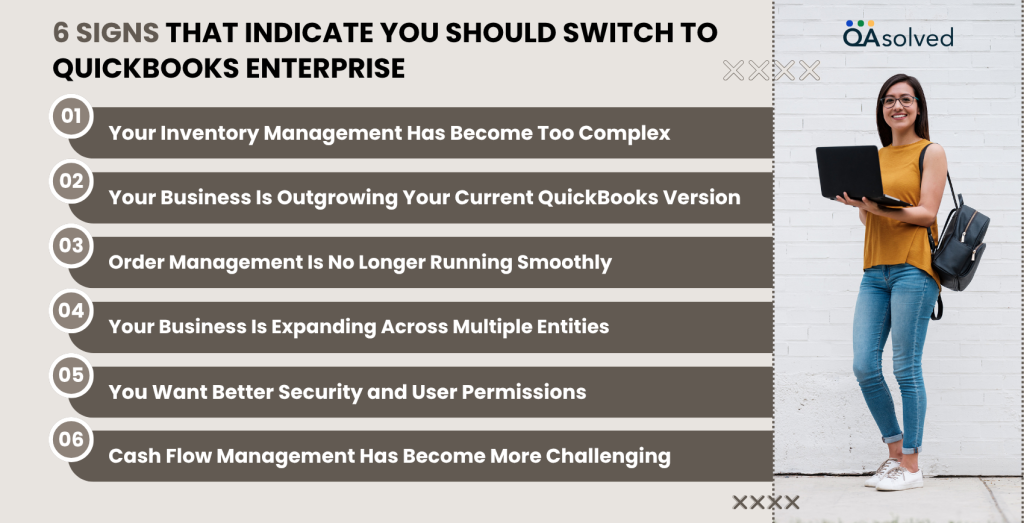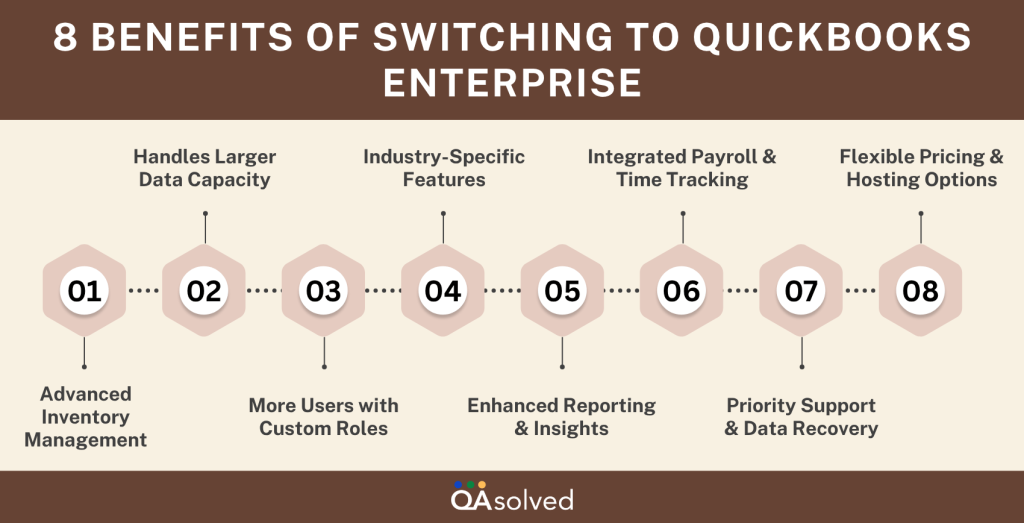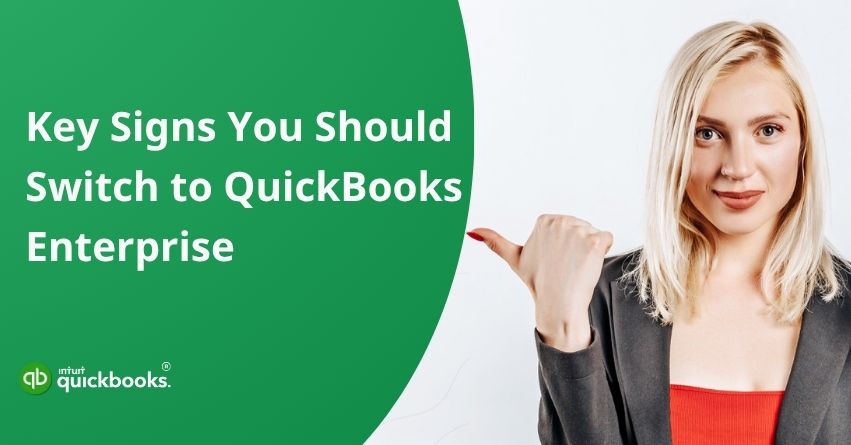Growth is a beautiful part of any business journey. It brings new opportunities, bigger goals, and sometimes, growing pains. One of the most common challenges growing businesses face is realizing that their current accounting or business software just isn’t cutting it anymore. At first, you might ignore the signs. After all, things still work… right? But then, generating reports starts taking longer than it should. Your inventory system becomes more confusing than helpful. You spend more time cleaning up data errors than making confident decisions. Slowly, you begin to feel that your tools are holding you back instead of helping you move forward.
If any of this sounds familiar, it may be time to consider a more powerful solution, like QuickBooks Enterprise. When small businesses expand, the tools that once helped streamline operations can become bottlenecks. And this is exactly when QuickBooks Enterprise comes into the equation. Built with features like advanced inventory management, customizable reporting, industry-specific tools, and multi-user functionality, QuickBooks Enterprise allows you to streamline your workflow and achieve financial accuracy.
On top of that, QuickBooks Enterprise offers structure and flexibility. Whether you’re managing thousands of SKUs, running payroll across multiple departments, or customizing pricing for different clients, this software has got you covered. If you’re thinking about switching to QuickBooks Enterprise, you’re in the right place. In this blog, we’ll walk you through the steps to upgrade from QuickBooks Pro or Premier to QuickBooks Enterprise. But before we get into the process, let’s first take a look at the key signs that indicate it’s time for an upgrade.
So, let’s get started!
6 Signs That Indicate You Should Switch to QuickBooks Enterprise
As your business grows, you might notice that your current accounting software isn’t keeping up. It might be crashing more often, limiting users, or making inventory management difficult. That is why businesses that need more advanced features, control, and flexibility should consider QuickBooks Enterprise. Here are the common signs that indicate users to switch from QB Pro and Premier versions to QuickBooks Enterprise.

1. Your Inventory Management Has Become Too Complex
If managing inventory has become a time-consuming headache, especially with multiple warehouses or locations, Enterprise can help. It simplifies tracking, transferring, and reordering stock with features like Advanced Inventory, barcode scanning, lot tracking, and FIFO costing. Other QuickBooks versions cannot offer this level of inventory control.
Perhaps your warehouse team is overburdened with manual inventory tasks, or you are handling perishable items that need expiration tracking. The advanced inventory features in QuickBooks Enterprise simplify these complexities, including:
- Multi-Location Tracking – Monitor stock levels across all your warehouses and storage sites in real time.
- Inventory Categories – Organize your inventory to make management and reporting easier by grouping items into categories.
- Expiration Date Tracking – Assign expiration dates to serial or lot numbers for perishable goods to ensure compliance and prevent losses.
- Mobile Inventory Management – Reduce errors, streamline picking, and boost warehouse productivity with handheld barcode scanners.
These tools can optimize your workflow-and it might be a clear sign that upgrading to QuickBooks Enterprise is the right choice.
2. Your Business Is Outgrowing Your Current QuickBooks Version
As your business grows, more team members will need access to your financial system. Your current QuickBooks version may be preventing you from providing simultaneous access to multiple users or from protecting sensitive data.
When you reach user limits or resort to risky practices such as sharing login credentials, you’ve outgrown your setup. There are several ways in which QuickBooks Enterprise addresses these challenges:
- Expanded User Capacity – Allows 30 users to work simultaneously, ideal for growing teams.
- Granular User Permissions – Allow or restrict employees’ access to specific areas of your accounting data.
- Custom Role-Based Access – Provide users with tailored roles and precise permissions to improve workflow.
Moving to Enterprise can enhance data integrity and streamline operations if bottlenecks, login conflicts, or security concerns become common.
3. Order Management Is No Longer Running Smoothly
Your customer experience can be seriously impacted if you have difficulty prioritizing sales, tracking order status, or deciding which warehouse should fulfill orders. Order fulfillment is simplified with below-mentioned QuickBooks Enterprise’s features:
- Order Prioritization – Sort and fulfill high-priority orders based on deadlines, stock levels, or value.
- Centralized Order Management – Track every order’s progress, whether it’s in the picking, packing, or shipping stages.
- Multi-Location Fulfillment Insight – Identify which warehouse can fulfill a specific order quickly.
These features make QuickBooks Enterprise a smart choice if delays, customer complaints, or fulfillment errors have become routine.
4. Your Business Is Expanding Across Multiple Entities
Your business may grow to include several companies or legal entities under one umbrella. When you switch between different systems or files, managing each entity separately can become time-consuming and error-prone. It provides better reporting, consolidated insights, and smoother workflows by allowing you to manage multiple entities efficiently.
When dealing with multiple entities or subsidiaries, it can become overwhelming, especially when intercompany transactions cause duplicate entries and complex reconciliations. With QuickBooks Enterprise, you can easily manage multiple entities by:
- Divide bills and checks between separate company files
- Maintain precise, independent records for each entity
- Minimize manual intervention in recording intercompany transactions
These built-in features in Enterprise may be exactly what you need if you spend too much time reconciling data between related businesses.
5. You Want Better Security and User Permissions
It becomes increasingly important to control who has access to your financial data as your business expands. Accounting software often offers limited user permissions, which puts your company’s financial integrity at risk of accidental data exposure or unauthorized changes.
The importance of safeguarding sensitive financial data increases as your business grows. The lack of controls in managing user access can lead to data exposure and security risks. The enhanced security features of QuickBooks Enterprise allow you to:
- Customize user permissions so that only specific financial information can be viewed or edited.
- Ensure employees only access what’s relevant to their roles by creating role-based access levels.
- Maintain data security while enabling smooth team collaboration.
An upgrade to Enterprise can provide peace of mind and better protect your business information if your current system lacks the security controls you need.
6. Cash Flow Management Has Become More Challenging
Maintaining a clear view of your cash flow can become increasingly challenging as your business grows. Incoming payments, outgoing expenses, payroll, and inventory costs can quickly overwhelm basic accounting tools. A lack of accurate, real-time cash flow insights can lead to missed opportunities and unexpected shortfalls.
This challenge can be simplified with QuickBooks Enterprise’s powerful cash flow management features. You can track money moving in and out of your business easily with its comprehensive reporting and forecasting tools.
In short, upgrading to QuickBooks Enterprise can give you the control and clarity you need to keep your business financially healthy and prepared for growth when it comes to balancing cash flow.
Upgrade to QuickBooks Enterprise from Desktop Pro/Premier
When upgrading to QuickBooks Desktop Enterprise, it’s best to do it after-hours or during the weekend if you’re a medium-sized business. In this way, you will have the least disruption to your normal work schedule. Here are the steps to successfully upgrade to QuickBooks Enterprise from Desktop Pro and Premier versions!
1. Meet Your Computers and Server Requirements to Run QuickBooks Enterprise
Ensure that your system is compatible before installing QuickBooks Desktop Enterprise to avoid performance issues. The QuickBooks Enterprise accounting solution requires specific hardware and software conditions to run smoothly.
Check the System Requirements for QuickBooks Desktop Enterprise.
2. Install QuickBooks Enterprise
Once your system is compatible with QuickBooks Enterprise, you can install it on your primary workstation or server. Start by downloading the installer from the official Intuit website or using the installation CD if one is provided. Make sure you choose the right installation type, either a standalone or network setup, based on your business needs.
During installation, you’ll need to enter your license and product numbers. Activate the software and configure your company file after it has been installed. To enable real-time collaboration across your team, install QuickBooks on additional workstations and set up multi-user mode.
3. Move Your Data from QuickBooks Pro or Premier to QuickBooks Enterprise
Make sure you backup your company file before moving your data to Enterprise. You can’t open your file in QuickBooks Pro or Premier once you move it to Enterprise.
Step 1: Backup Your Company File
- Go to File and select Create Backup.
- Choose a safe location for your file, such as a different computer or server.
Step 2: Update Your Company File
Once you have a backup of your current company file, it is time to update it for QuickBooks Desktop Enterprise.
- Open your company file in QuickBooks Desktop Enterprise.
- Select OK after entering the Admin password.
- Select Update Now to update my company file to this new version of QuickBooks.
- Then click OK to back up your data and follow the on-screen instructions to do so.
- To update your file, select Yes.
Step 3: Set Up User Permissions
With QuickBooks Enterprise, you’ll continue to enjoy the familiar look and functionality of your previous QuickBooks version. Your existing vendor, customer, and item lists will seamlessly transfer to Enterprise. QuickBooks Enterprise removes those limitations, making it an ideal choice for growing businesses compared to QuickBooks Pro or Premier.
Additionally, you can assign specific permissions to each user. With QuickBooks Enterprise, you can collaborate with up to 30 users at the same time, making it easier for teams to work together efficiently and securely.
Step 4: Activate QuickBooks Enterprise
Finally, activate QuickBooks Enterprise to unlock full features, including priority technical support, advanced reporting, and more.
Once you’ve transferred your lists, customized permissions, and activated QuickBooks Enterprise, you’re ready to go. This system supports your growing business needs with advanced inventory tracking, detailed reporting, and multi-user access.
Now that we are aware of the steps, let’s wind up this blog with the benefits of switching from QB Pro and Premier or any other software to QB Enterprise.
8 Benefits of Switching to QuickBooks Enterprise
As your business grows, so do your needs, especially when it comes to finances, inventory, and operations. If you’ve been using QuickBooks Pro or Premier, you might be noticing their limitations. This is where QuickBooks Enterprise comes in. The system is designed to meet the needs of growing companies that need more control, flexibility, and power. Take a look at the top reasons to switch:

1. Advanced Inventory Management
Inventory tracking features like barcode scanning, real-time updates, and FIFO costing are available in QuickBooks Enterprise. Multiple warehouses can be managed, inventory can be tracked across locations, and reordering can be automated.
2. Handles Larger Data Capacity
Your data grows as your business grows. With QuickBooks Enterprise, you can manage up to 1 million customer, vendor, and inventory records, a much greater number than you can with QuickBooks Pro or Premier.
3. More Users with Custom Roles
You can add up to 40 users, each with their own access level. Larger teams that require role-specific permissions to keep data secure and workflows efficient will benefit from this feature.
4. Industry-Specific Features
The Enterprise edition includes versions tailored for industries such as manufacturing, wholesale, construction, nonprofits, and more. Your field-specific workflows and reports are included in each version.
5. Enhanced Reporting & Insights
Advanced Reporting provides you with customizable, detailed reports that provide insights into your business. Track profitability, cash flow, and job costs easily.
6. Integrated Payroll & Time Tracking
QuickBooks Enterprise seamlessly integrates with payroll tools like Enhanced Payroll and time tracking tools like QuickBooks Time. It simplifies employee management and ensures accurate job costing and pay runs.
7. Priority Support & Data Recovery
With QuickBooks’ Data Recovery Service, you’ll receive premium customer support and automatic data backups. Your business can run smoothly without worrying about technical problems.
8. Flexible Pricing & Hosting Options
Hosting can be done locally or in the cloud. Cloud-based solutions allow remote access from anywhere, making them an ideal option for companies with remote teams or multiple locations.
In a nutshell, Investing in QuickBooks Enterprise isn’t just about accessing more features; it’s about preparing your business for the future. Enterprise helps you streamline operations and scale confidently with smarter inventory tracking, customized user roles, and deeper financial insights. You might want to consider switching if your current setup is causing you problems.
Summary
As your business evolves, so should the tools that support it. If you’re frequently running into limitations with QuickBooks Pro or Premier, or if your accounting team is struggling to manage complex inventory, growing user needs, or financial data across multiple locations, it’s likely time to consider an upgrade. QuickBooks Enterprise is not just a more advanced version, it’s a robust solution built for businesses that demand scalability, control, and efficiency.
With features like multi-location inventory tracking, custom user permissions, industry-specific functionality, and enhanced reporting, QuickBooks Enterprise bridges the gap between growth and performance. It empowers your team with the tools needed to reduce manual work, avoid costly errors, and make faster, data-driven decisions. Plus, with options for cloud hosting, remote access, and premium support, it fits seamlessly into the modern workflow of growing companies.
Upgrading might feel like a big step, but it’s also a strategic move toward stronger financial management and operational excellence. If you’re ready to unlock your business’s full potential, QuickBooks Enterprise could be the upgrade that gets you there. And in case you’re facing trouble in executing the above-mentioned steps, then we would advise you to connect with QuickBooks Enterprise Support.
Frequently Asked Questions
The QuickBooks Enterprise software is ideal for businesses requiring high volumes or complex inventory management. Tracking across multiple locations, scanning barcodes, tracking serial and lot numbers, managing expiration dates, and real-time inventory status helps streamline operations, reduce errors, and improve inventory control across warehouses or storage sites so that accuracy and efficiency are improved.
Yes, QuickBooks Enterprise is the right upgrade if your team is growing and you need more than 5–10 users. The application supports up to 30 simultaneous users and provides advanced role-based access control.
QuickBooks Enterprise is designed for businesses that need more power, flexibility, and advanced features than QuickBooks Online, Pro, or Premier can deliver. Supports up to 1 million list items, 30 simultaneous users, and offers advanced inventory management, customizable reporting, job costing, payroll, and industry-specific features. As well as providing stronger data security, user permissions, and integration capabilities, it is ideal for businesses looking to scale operations without outgrowing their accounting software.
Yes, of course. Managing multiple business locations or subsidiaries is easy with QuickBooks Enterprise. Multi-location inventory tracking and intercompany transaction support make it easier to coordinate and streamline operations among various entities while maintaining accurate financial records.
Yes, QuickBooks Enterprise requires an annual subscription. Renewal is required to continue using the software and access features such as updates, support, and security. Subscription plans include Silver, Gold, Platinum, and Diamond, with each offering different tools. Payment options are available every month. Perpetual licenses are no longer available in QuickBooks, so a subscription is required to continue using the software.


